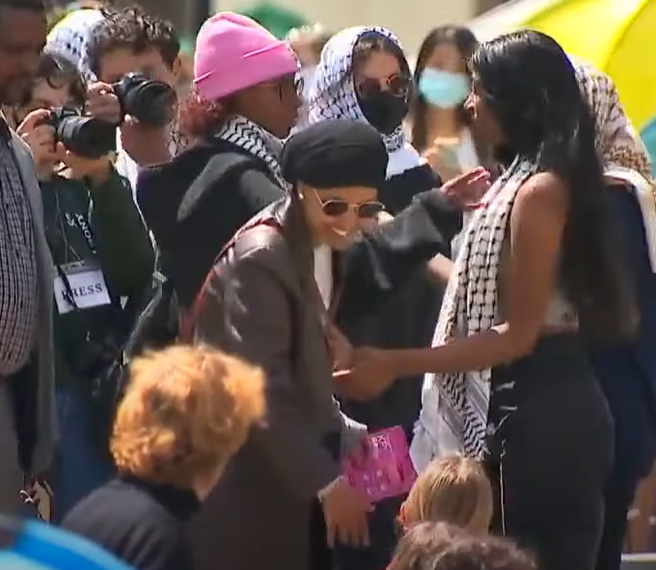In the midst of ongoing campus protests at Columbia University, where pro-Palestinian groups have set up encampments demanding divestment from companies they accuse of profiting from conflicts in Gaza, the appearance of Congresswoman Ilhan Omar has stirred debate. During her visit, Rep. Omar was asked to reflect on the impact of the protests on Jewish students, specifically regarding the rise in anti-Semitic sentiments. Her response, which attempted to navigate the complex and heated emotions on campus, left many feeling that her words were offensive.
Rep. Omar stated, “I actually met a lot of Jewish students that are in the encampment, and I think it is really unfortunate that people don’t care about the fact that all Jewish kids should be kept safe and that we should not have to tolerate anti-Semitism or bigotry for all Jewish students, whether they are pro-genocide or anti-genocide.” These comments have sparked controversy for seemingly equating the self-defense actions of Israel with genocide, a term heavily loaded and widely disputed in this context. Such statements do more harm than good by inflaming tensions and misrepresenting the nature of the conflict between Israel and Hamas.
It’s important to understand that Israel’s military actions, often cited by detractors as disproportionate, are targeted against Hamas, a terrorist group internationally recognized for its use of human shields and other tactics that endanger civilians. This is not just a point of contention but a documented strategy that complicates the conflict significantly.
Rep. Omar’s focus on the pro-Palestinian protesters’ demands during her visit, while emphasizing the peaceful nature of their protest, also highlights a selective engagement with the broader student body’s concerns. Her approach to addressing the fears and experiences of Jewish students, who report feeling targeted by anti-Semitic chants and actions, is nothing more than an attempt to appear somewhat compassionate for all – she doesn’t.
Moreover, the framing of the Israeli-Palestinian conflict as a simple matter of aggression versus victimhood overlooks the complex, nuanced realities on the ground. By using terms like “pro-genocide,” gas lights the issues and does nothing to ease tensions on these campus demonstrations.
Final Thoughts
The role of a politician, especially during times of social unrest and conflict, is not only to echo the sentiments of a particular group but to address the needs and concerns of all constituents. In her comments, Rep. Omar missed an opportunity to bridge divides and foster a dialogue that respects and acknowledges the fears and needs of all students, not just those whose voices are the loudest. I’m not surprised, I continue to question how this person ever became a US Congresswoman.


Omar needs kicked out of the country.